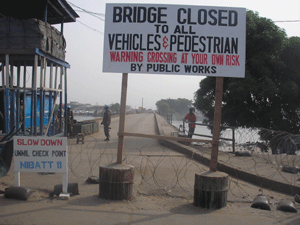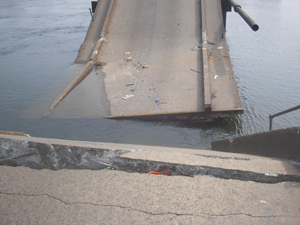 |
 |
Growing up in the 1960s and 1970s, many could not afford “five cents or a dime” to take a hold-it, hold-it (commercial bus) across the bridge. As a result, this now collapsed bridge came to know the soles of thousands of feet. The bridge also served as home for the wretched poor or homeless. But now the long awaited ill-fate has finally occurred. The oldest and most strategic bridge that links the mainland and Monrovia with Bushrod Island has finally crumbled. What is worse is that the collapse of this strategic artery has added a major and significant financial burden on the Sirleaf government, already hamstrung by lack of funds for reconstruction of a country destroyed by fifteen years of stupid and senseless civil war. How ironic that Liberian political leaders in the 1980s and 1990s could find capital to purchase instruments of death and destruction and yet could not find the means to repair the ageing bridge which had served the country so well and for so long.
The loss of Mesurado Bridge is no surprise to any Liberian over the age of 40. That is because the bridge had never had regular maintenance since the 1940s or a major overhaul during the intervening years. During the years (1960s) of economic prosperity (for the elite) and stability in Liberia, we anticipated the bridge would collapse at any time. Yet we never took the opportunity to study the decaying structures and appropriate the needed funds to repair it which could have been done on the cheap, thus adding another 25 to 50 years’ life to the bridge. In the 1980s, economic and military aid from the United States alone surpassed $500 million. With this flood of money in the country, no one or group in or out of government ever raised the red flag to call attention to the ageing bridges in Liberia. Once more with surplus resources, the repairing of the ageing bridges did not blink on the Liberian government’s radar scope. By the 1990s it was too late. Power-hungry fools in and out of Liberia had plunged the country into the worst civil war with no national purpose except for self-aggrandizement of the individuals involved. The war lasted for fifteen years and the meager development we had achieved since 1847 was wiped out.
The ill fate of the Mesurado Bridge awaits other bridges of strategic importance in the country’s transportation system. The three most important of these are the St. Paul Bridge, the Stephen Tolbert Bridge, and the bridge linking Lofa County with Bong County. The collapsed Mesurado Bridge is a wake-up call to the people and government of Liberia to immediately undertake a study of the decaying structures of the remaining bridges and begin the necessary repairs. At this point in time when resources (money) are extremely scares in our country, it is economically prudent to maintain vital structures still intact rather neglecting them to the fate of natural decay and the need to build new ones.
All of the past governments of Liberia have notorious
records of maintaining any structure once it has been
built. We have erected beautiful edifices and watched
them deteriorate within a matter of few years due to
lack of interest in maintenance or repair. The collapse
of Mesurado Bridge is a clear example of our indifference
to the principle of maintenance and repair. I think
that rebuilding Mesurado Bridge should be funded by
government-issue long-term bonds and the operation of
the bridge be contracted to a private Liberian company.
The government bonds should first be made available
to Liberians at home, and most especially to Liberians
abroad who have the resources to purchase large quantities.
This will give Liberians a personal vested interest
to see that the bond is managed efficiently and the
new bridge is appropriately maintained. The company
will impose toll fees for all vehicles crossing the
bridge. This act will make the bridge self-sustaining
and free the government from additional expenses. Since
the Liberian government cannot be sued for negligence
which causes harm to people or public property, privatizing
the operation of the rebuilt bridge will result in an
entity accountable for its safe operation. The government
and bond holders can take legal action against the company
for any structural defects which may endanger public
safety.
J. Patrick Flomo can be reached at: flomoenterprise@yahoo.com, 614 256 6616
Columbus, Ohio. USA
November 15, 2006
© 2006 by The Perspective
E-mail: editor@theperspective.org
To Submit article for publication, go to the following URL: http://www.theperspective.org/submittingarticles.html
